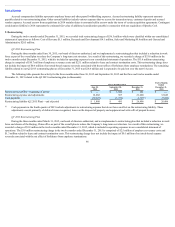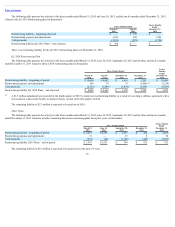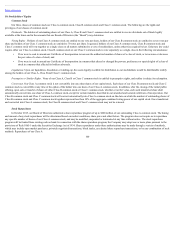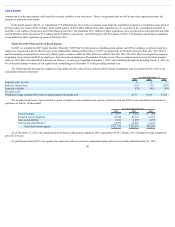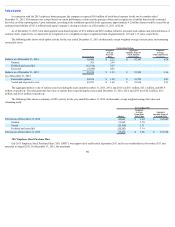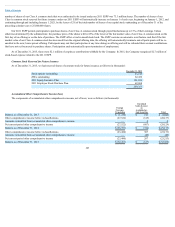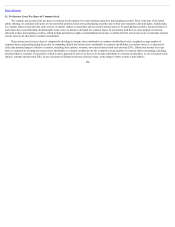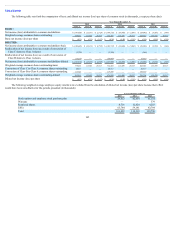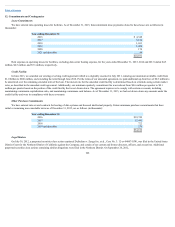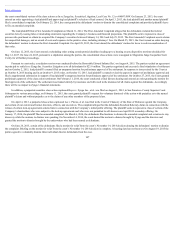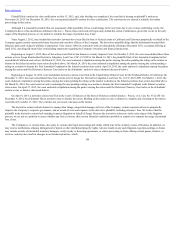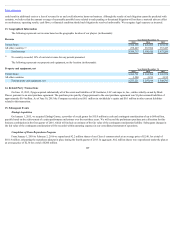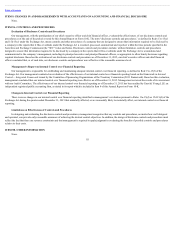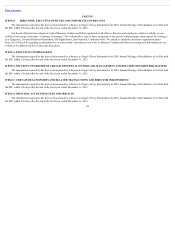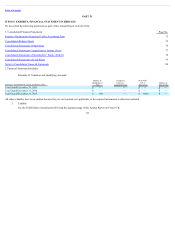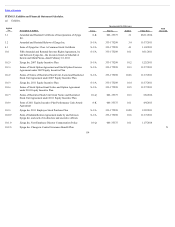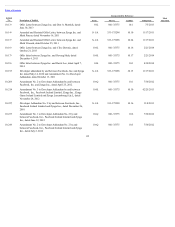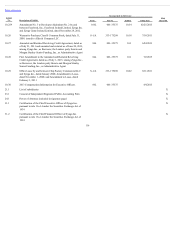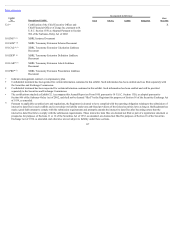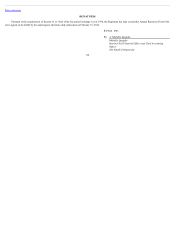Zynga 2015 Annual Report Download - page 111
Download and view the complete annual report
Please find page 111 of the 2015 Zynga annual report below. You can navigate through the pages in the report by either clicking on the pages listed below, or by using the keyword search tool below to find specific information within the annual report.
Table of Contents
Plaintiff filed a motion for class certification on July 13, 2015, and, after briefing was completed, the court held a hearing on plaintiff’s motion on
November 20, 2015. On December 30, 2015, the court granted plaintiff’s motion for class certification. The court has not yet entered a schedule for further
proceedings in this action.
Although it is reasonably possible that our assessment of the possibility of loss could change in the near term due to one or more confirming events, the
Company believes it has meritorious defenses in the Lee v. Pincus class action and will vigorously defend this action. Furthermore, given that we are in the early
stages of the litigation process, we are unable to estimate the range of potential loss, if any.
Since August 3, 2012, nine stockholder derivative lawsuits have been filed in State or Federal courts in California and Delaware purportedly on behalf of the
Company against certain current and former directors and executive officers of the Company. The derivative plaintiffs allege that the defendants breached their
fiduciary duties and violated California Corporations Code section 25402 in connection with our initial public offering in December 2011, secondary offering in
April 2012, and allegedly made false or misleading statements regarding the Company’s business and financial projections.
Beginning on August 3, 2012, three of the actions were filed in San Francisco County Superior Court. On October 2, 2012, the court consolidated those three
actions as In re Zynga Shareholder Derivative Litigation, Lead Case CGC-12-522934. On March 14, 2013, the plaintiffs filed a First Amended Complaint in that
consolidated California state action. On March 21, 2013, the court endorsed a stipulation among the parties staying the action pending the ruling on the motion to
dismiss in the federal securities class action described above. On March 24, 2014, the court endorsed a stipulation among the parties staying the action pending a
ruling on a motion to dismiss the First Amended Complaint in the federal securities class action. April 24, 2015, the court endorsed a stipulation among the parties
staying the action until the Delaware Chancery Court rules on the defendants’ motion to stay or dismiss (discussed below).
Beginning on August 16, 2012, four stockholder derivative actions were filed in the United States District Court for the Northern District of California. On
December 3, 2012, the court consolidated these four actions as In re Zynga Inc. Derivative Litigation, Lead Case No. 12-CV-4327-JSW. On March 11, 2013, the
court endorsed a stipulation among the parties staying the action pending the ruling on the motion to dismiss in the federal securities class action described above.
On March 21, 2014, the court issued an order continuing the stay pending a ruling on a motion to dismiss the First Amended Complaint in the federal securities
class action. On April 27, 2015, the court endorsed a stipulation among the parties staying the action until the Delaware Chancery Court rules on the defendants’
motion to stay or dismiss (discussed below).
On April 4, 2014, a derivative action was filed in the Court of Chancery of the State of Delaware entitled Sandys v. Pincus, et al. Case No. 9512-CB. On
December 9, 2014, the defendants filed a motion to stay or dismiss the action. Briefing on the motion to stay or dismiss is complete and a hearing on the motion
was held on November 17, 2015. The court has not yet issued a decision on the motion.
The derivative actions include claims for, among other things, unspecified damages in favor of the Company, certain corporate actions to purportedly
improve the Company’s corporate governance, and an award of costs and expenses to the derivative plaintiffs, including attorneys’ fees. We believe that the
plaintiffs in the derivative actions lack standing to pursue litigation on behalf of Zynga. Because the derivative actions are in the early stages of the litigation
process, we are not in a position to assess whether any loss or adverse effect on our financial condition is probable or remote or to estimate the range of potential
loss, if any.
The Company is, at various times, also party to various other legal proceedings and claims which arise in the ordinary course of business. In addition, we
may receive notifications alleging infringement of patent or other intellectual property rights. Adverse results in any such litigation, legal proceedings or claims
may include awards of substantial monetary damages, costly royalty or licensing agreements, or orders preventing us from offering certain games, features, or
services, and may also result in changes in our business practices, which
108


